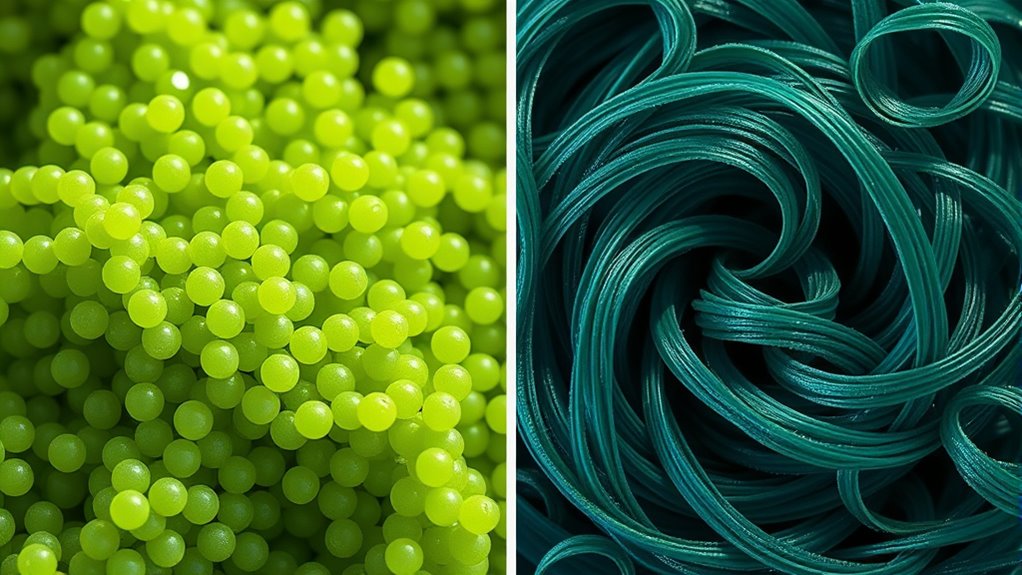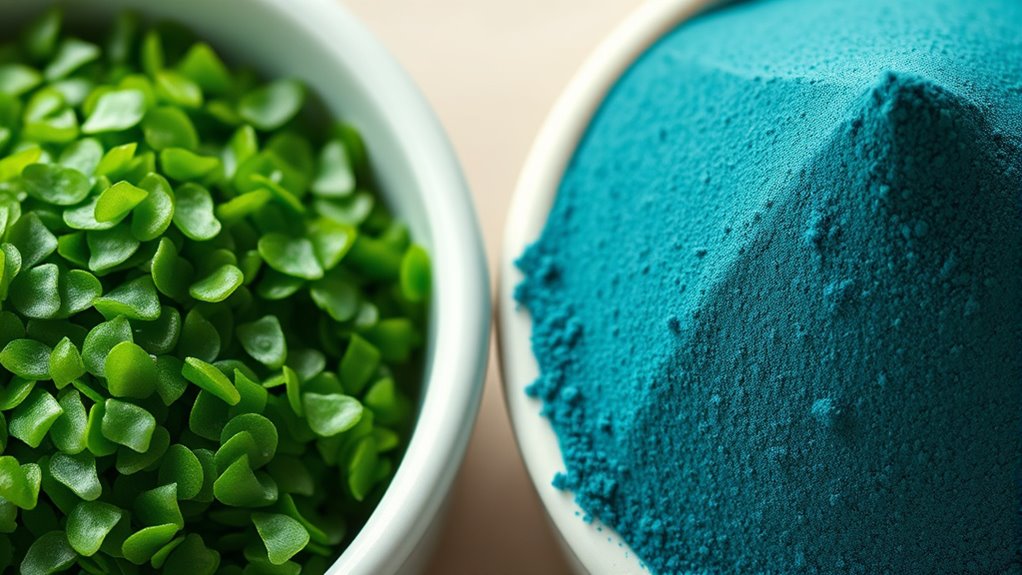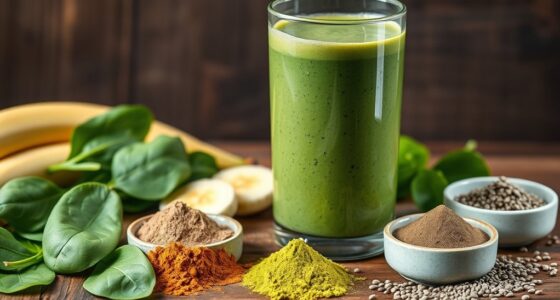If you’re deciding between chlorella and spirulina, consider your health goals. Choose chlorella if you want detoxification, liver support, and a rich source of chlorophyll and micronutrients. Opt for spirulina if you need an energy boost, immune support, and high protein content. Both algae are environmentally friendly options that can fit into your diet differently. Keep exploring to find out which superfood aligns best with your specific needs and preferences.
Key Takeaways
- Choose Chlorella for detoxification and liver health due to its high chlorophyll content.
- Opt for Spirulina if you want a protein-rich superfood that boosts energy and immune function.
- Consider cultivation methods: Chlorella is grown in controlled environments, ensuring steady supply; Spirulina in brackish water.
- Both algae are environmentally friendly options that reduce ecological footprints compared to animal proteins.
- Combining Chlorella and Spirulina offers a comprehensive nutrient profile for diverse health benefits.

Are you wondering whether chlorella or spirulina is the better superfood algae to boost your health? Both are nutrient-dense superfoods packed with essential vitamins, minerals, and antioxidants, but they differ in their nutrient profiles and environmental impacts. When comparing these two, you’ll find that nutrient density plays a key role. Chlorella is renowned for its high levels of chlorophyll, protein, and an impressive array of micronutrients like iron, zinc, and B vitamins. Spirulina, on the other hand, boasts a higher concentration of plant-based protein—around 60-70% of its dry weight—and is particularly rich in phycocyanin, a potent antioxidant. If you’re looking to maximize nutrient intake, both algae offer notable benefits, but your choice might hinge on specific nutritional needs. For example, if you’re seeking a natural detoxifier or a source of chlorophyll, chlorella’s high chlorophyll content can support liver health and detoxification. Spirulina, with its high protein and antioxidant content, can help boost energy and immune function. Additionally, the cultivation methods of these algae influence their environmental impact, with chlorella being adaptable to various controlled environments supporting sustainable cultivation. Beyond individual nutrients, sustainability benefits matter when choosing your superfood algae. Both chlorella and spirulina are considered environmentally friendly compared to traditional animal-based protein sources. They require much less land, water, and energy to produce, making them sustainable options for eco-conscious consumers. Chlorella, being a freshwater algae, can be cultivated in controlled environments, reducing the risk of contamination and ensuring a steady supply without harming natural ecosystems. Spirulina, typically grown in brackish water bodies or controlled ponds, also has a low environmental footprint and can be harvested efficiently. Choosing either supports a more sustainable food system, but chlorella’s ability to be cultivated in a variety of environments adds to its appeal from a sustainability standpoint. In essence, your decision should consider both nutrient density and sustainability benefits. Chlorella offers a broader spectrum of micronutrients and detoxifying properties, making it ideal if you want to enhance your body’s cleansing processes. Spirulina excels in providing a high-quality protein source and powerful antioxidants that can energize and strengthen your immune system. Both algae are environmentally friendly choices, helping reduce your ecological footprint. Ultimately, you might opt for incorporating both into your diet at different times, leveraging their unique benefits for best health.
Frequently Asked Questions
Can Chlorella or Spirulina Help With Detoxification?
You might wonder if chlorella or spirulina can help with detoxification. Both offer notable detox benefits through algae cleansing, which supports your body’s natural ability to eliminate toxins. Chlorella is especially known for its ability to bind heavy metals, while spirulina provides antioxidants that aid in detox processes. Incorporating these superfood algae into your diet can boost your overall detox efforts and promote better health.
Are There Any Known Allergies to Chlorella or Spirulina?
You might wonder if you’re allergic to chlorella or spirulina. While rare, some people experience allergy symptoms like itching, swelling, or difficulty breathing, indicating immune reactions. If you notice any of these signs after taking these superfoods, stop using them immediately and consult a healthcare professional. It’s always best to start with a small dose to see how your body reacts and prevent potential adverse reactions.
How Do Storage Conditions Affect the Potency of These Algae?
You should know that storage conditions considerably impact the potency of chlorella and spirulina. Poor storage stability can cause nutrient degradation over time. To preserve their benefits, keep these algae in airtight containers, away from moisture, heat, and direct sunlight. Using proper preservation methods, like refrigeration or freezing, helps maintain their freshness and potency longer, ensuring you get the maximum nutritional value from each dose.
Can These Superfoods Be Incorporated Into a Vegan Diet?
They say, “You are what you eat,” and that’s true for vegan diets too. You can easily incorporate superfoods like chlorella and spirulina into your vegan recipes, making them richer in nutrients. These plant-based supplements boost your health and add flavor. Use them in smoothies, salads, or energy bites. Yes, these algae are perfect for a vegan lifestyle, providing essential vitamins and minerals naturally.
What Are the Environmental Impacts of Cultivating Chlorella Versus Spirulina?
When comparing the environmental impacts of cultivating chlorella and spirulina, you should consider sustainable farming practices and water usage. Chlorella typically requires less water and can grow efficiently on non-arable land, making it more eco-friendly. Spirulina, however, often needs more water and specific conditions. By choosing algae with lower water consumption and sustainable farming methods, you contribute to reducing environmental strain and promoting eco-conscious food choices.
Conclusion
Choosing between chlorella and spirulina is like picking a star from the night sky—each offers unique benefits that can illuminate your health journey. Whether you seek the cleansing power of chlorella or the vibrant energy boost of spirulina, remember that both are gifts from nature’s ocean and freshwater depths. Your choice reflects a personal voyage toward wellness, guided by the subtle symbolism of these superfoods—each shining brightly, inviting you to embrace their life-enhancing secrets.










